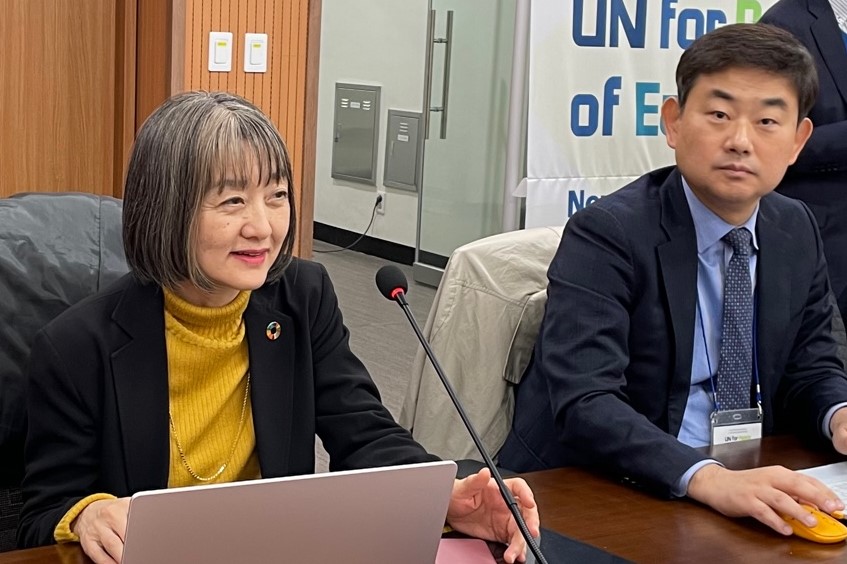Presentation on Human Security Delivered at the East Asian Seminar on the United Nations System
2024.02.13
Muto Ako, specially appointed research fellow at the JICA Ogata Sadako Research Institute for Peace and Development (JICA Ogata Research Institute), participated in the 22nd East Asian Seminar on the United Nations System, which was held at the International Convention Center, Jeonbuk National University, South Korea, from Nov. 24 to 25, 2023.
This seminar is held annually and serves as a forum for academic exchange between organizations from three countries that conduct studies on the United Nations (UN): China Academic Network for United Nations Studies (CANUNS), Korea Academic Council on the United Nations System (KACUNS) and Japan Association for United Nations Studies (JAUNS).

Muto Ako, specially appointed research fellow, JICA Ogata Research Institute (left), and Jae Jeok Park, associate professor, Yonsei University (right)
The seminar started with opening remarks from Choi Dong Ju, president of KACUNS, Yamada Tetsuya, president of JAUNS, and Wang Ying, deputy director-general of CANUNS. A video message from former UN Secretary-General Ban Ki-moon followed. Welcome speeches were then given by Yang O-Bong, president of Jeonbuk National University, and Kim Kwan-young, governor of Jeollabuk-do, followed by a keynote lecture by Kim Sook, former permanent representative of the Republic of Korea to the UN.
The two-day event featured five sessions titled “East Asian contribution to peacekeeping and peacebuilding in the world,” “UN’s approaches to accelerating the implementation of SDGs as scheduled,” “UN’s role in the post-pandemic era,” “UN’s contribution to the three states in their history,” and “UN for peace and prosperity of East Asia.” Presenters from China, South Korea and Japan shared their research outcome during each session and actively discussed with over 20 participants, including discussants, and the following points were confirmed: from their respective positions, the three countries are making great contributions to a wide range of UN activities; and the world is facing so many challenges today while the UN, the one and only international organization with 194 member states, holds crucially important roles.
In the session titled “UN’s role in the post-pandemic era,” Muto examined the expected roles of the UN in the post-pandemic world from human security perspectives. Professor Yamada Tetsuya (Nanzan University), who is the current president of JAUNS, Inomata Tadanori, former ambassador of Japan to Costa Rica and currently a JAUNS board member, Professors Kukita Jun and Mochizuki Yasue (Kwansei Gakuin University), Professor Ogawa Hiroko (Tokai University), Professor Tamai Masataka (Tohoku University of Community Service and Science) and Professor Uemura Takehiko (Yokohama City University) also contributed to each session through their roles as session chairs, presenters or discussants. The seminar provided an invaluable opportunity for participants from the three countries to not only deepen their understanding on diverse UN activities but also to build networks with each other.
The 2024 East Asian Seminar on the United Nations System is to be hosted by JAUNS. 2024 is a key year as the UN will host the Summit of the Future while all three countries will serve as UN Security Council members. With UN activities increasingly becoming important, this seminar is expected to facilitate and further develop the continued exchange between the organizations that are conducting studies on the UN in China, South Korea and Japan.
Summaries of the seminar can be found in the websites of CANUNS, KACUNS and JAUNS as well.

事業事前評価表(地球規模課題対応国際科学技術協力(SATREPS)).国際協力機構 地球環境部 . 防災第一チーム. 1.案件名.国 名: フィリピン共和国.

事業事前評価表(地球規模課題対応国際科学技術協力(SATREPS)).国際協力機構 地球環境部 . 防災第一チーム. 1.案件名.国 名: フィリピン共和国.

事業事前評価表(地球規模課題対応国際科学技術協力(SATREPS)).国際協力機構 地球環境部 . 防災第一チーム. 1.案件名.国 名: フィリピン共和国.

事業事前評価表(地球規模課題対応国際科学技術協力(SATREPS)).国際協力機構 地球環境部 . 防災第一チーム. 1.案件名.国 名: フィリピン共和国.

事業事前評価表(地球規模課題対応国際科学技術協力(SATREPS)).国際協力機構 地球環境部 . 防災第一チーム. 1.案件名.国 名: フィリピン共和国.
scroll